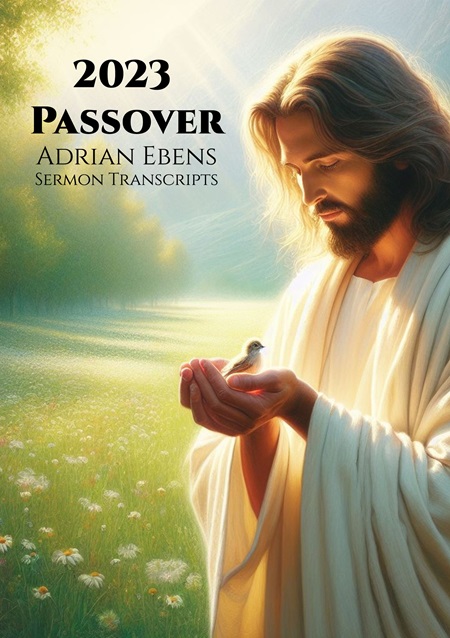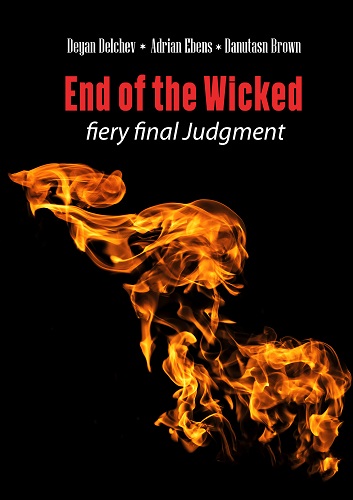The wicked shall NOT be finally saved but lost forever
[The Bible speaks clearly on the subject of eternal life and eternal death. No better explanation of this could be given than the words recorded in the book Great Controversey. The language is unmistakable. Those who have had confidence in the Spirit of Prophecy who reject these words are stepping off the platform and preparing themselves for everlasting destruction. Now is the time of salvation. Today if you will hear our Father's voice, harden not your hearts. It is in this life only that you may prepare for eternity. In this life we are preparing characters that will either live forever with God and His Son or be lost forever. Those who accept the false idea that all will be saved are rejecting the Testimony of Jesus. We appeal to all to not take this terrible path that leads to eternal death. Come into the arms of Jesus now and receive His Spirit and be saved. For more on this subject see the booklet Last Message of Mercy]
Great Controversy Pages 540-544
Let us consider what the Bible teaches further concerning the ungodly and unrepentant, whom the Universalist places in heaven as holy, happy angels.
"I will give unto him that is athirst of the fountain of the water of life freely." Revelation 21:6. This promise is only to those that thirst. None but those who feel their need of the water of life, and seek it at the loss of all things else, will be supplied. "He that overcometh shall inherit all things; and I will be his God, and he shall be My son." Verse 7. Here, also, conditions are specified. In order to inherit all things, we must resist and overcome sin.
The Lord declares by the prophet Isaiah: "Say ye to the righteous, that it shall be well with him." "Woe unto the wicked! it shall be ill with him: for the reward of his hands shall be given him." Isaiah 3:10, 11. "Though a sinner do evil an hundred times," says the wise man, "and his days be prolonged, yet surely I know that it shall be well with them that fear God, which fear before Him: but it shall not be well with the wicked." Ecclesiastes 8:12, 13. And Paul testifies that the sinner is treasuring up unto himself "wrath against the day of wrath and revelation of the righteous judgment of God; who will render to every man according to his deeds;" "tribulation and anguish upon every soul of man that doeth evil." Romans 2:5, 6,9.
"No fornicator, nor unclean person, nor covetous man, who is an idolater, hath any inheritance in the kingdom of Christ and God." Ephesians 5:5, A.R.V. "Follow peace with all men, and holiness, without which no man shall see the Lord." Hebrews 12:14. "Blessed are they that do His commandments, that they may have right to the tree of life, and may enter in through the gates into the city. For without are dogs, and sorcerers, and whoremongers, and murderers, and idolaters, and whosoever loveth and maketh a lie." Revelation 22:14, 15.
God has given to men a declaration of His character and of His method of dealing with sin. "The Lord God, merciful and gracious, long-suffering and abundant in goodness and truth, keeping mercy for thousands, forgiving iniquity and transgression and sin, and that will by no means clear the guilty." Exodus 34:6, 7. "All the wicked will He destroy." "The transgressors shall be destroyed together: the end of the wicked shall be cut off." Psalm 145:20; 37:38. The power and authority of the divine government will be employed to put down rebellion; yet all the manifestations of retributive justice will be perfectly consistent with the character of God as a merciful, long-suffering, benevolent being.
God does not force the will or judgment of any. He takes no pleasure in a slavish obedience. He desires that the creatures of His hands shall love Him because He is worthy of love. He would have them obey Him because they have an intelligent appreciation of His wisdom, justice, and benevolence. And all who have a just conception of these qualities will love Him because they are drawn toward Him in admiration of His attributes.
The principles of kindness, mercy, and love, taught and exemplified by our Saviour, are a transcript of the will and character of God. Christ declared that He taught nothing except that which He had received from His Father. The principles of the divine government are in perfect harmony with the Saviour's precept, "Love your enemies." God executes justice upon the wicked, [God's jusitice is defined in Psalm 9:16 - The wicked are snared in the work of their own hand. God allows men to reap the consequences of their own choices. Evil shall slay the wicked Ps 34:21] for the good of the universe, and even for the good of those upon whom His judgments are visited. He would make them happy if He could do so in accordance with the laws of His government and the justice of His character. He surrounds them with the tokens of His love, He grants them a knowledge of His law, and follows them with the offers of His mercy; but they despise His love, make void His law, and reject His mercy. While constantly receiving His gifts, they dishonor the Giver; they hate God because they know that He abhors their sins. The Lord bears long with their perversity; but the decisive hour will come at last, when their destiny is to be decided. Will He then chain these rebels to His side? Will He force them to do His will?
Those who have chosen Satan as their leader and have been controlled by his power are not prepared to enter the presence of God. Pride, deception, licentiousness, cruelty, have become fixed in their characters. Can they enter heaven to dwell forever with those whom they despised and hated on earth? Truth will never be agreeable to a liar; meekness will not satisfy self-esteem and pride; purity is not acceptable to the corrupt; disinterested love does not appear attractive to the selfish. What source of enjoyment could heaven offer to those who are wholly absorbed in earthly and selfish interests?
Could those whose lives have been spent in rebellion against God be suddenly transported to heaven and witness the high, the holy state of perfection that ever exists there,-- every soul filled with love, every countenance beaming with joy, enrapturing music in melodious strains rising in honor of God and the Lamb, and ceaseless streams of light flowing upon the redeemed from the face of Him who sitteth upon the throne,--could those whose hearts are filled with hatred of God, of truth and holiness, mingle with the heavenly throng and join their songs of praise? Could they endure the glory of God and the Lamb? No, no; years of probation were granted them, that they might form characters for heaven; but they have never trained the mind to love purity; they have never learned the language of heaven, and now it is too late. A life of rebellion against God has unfitted them for heaven. Its purity, holiness, and peace would be torture to them; the glory of God would be a consuming fire. They would long to flee from that holy place. They would welcome destruction, that they might be hidden from the face of Him who died to redeem them. The destiny of the wicked is fixed by their own choice. Their exclusion from heaven is voluntary with themselves, and just and merciful on the part of God.
Like the waters of the Flood the fires of the great day declare God's verdict that the wicked are incurable. They have no disposition to submit to divine authority. Their will has been exercised in revolt; and when life is ended, it is too late to turn the current of their thoughts in the opposite direction, too late to turn from transgression to obedience, from hatred to love.
In sparing the life of Cain the murderer, God gave the world an example of what would be the result of permitting the sinner to live to continue a course of unbridled iniquity. Through the influence of Cain's teaching and example, multitudes of his descendants were led into sin, until "the wickedness of man was great in the earth" and "every imagination of the thoughts of his heart was only evil continually." "The earth also was corrupt before God, and the earth was filled with violence." Genesis 6:5, 11.
In mercy to the world, God blotted out its wicked inhabitants in Noah's time. In mercy He destroyed the corrupt dwellers in Sodom. Through the deceptive power of Satan the workers of iniquity obtain sympathy and admiration, and are thus constantly leading others to rebellion. It was so in Cain's and in Noah's day, and in the time of Abraham and Lot; it is so in our time. It is in mercy to the universe that God will finally destroy the rejecters of His grace. [God destroys them by allowing sin to complete its work of Destruction. God does not interfere to prevent the harvest that the sinner has planted.]
"The wages of sin is death; but the gift of God is eternal life through Jesus Christ our Lord." Romans 6:23. While life is the inheritance of the righteous, death is the portion of the wicked. Moses declared to Israel: "I have set before thee this day life and good, and death and evil." Deuteronomy 30:15. The death referred to in these scriptures is not that pronounced upon Adam, for all mankind suffer the penalty of his transgression. It is "the second death" that is placed in contrast with everlasting life.
In consequence of Adam's sin, death passed upon the whole human race. All alike go down into the grave. And through the provisions of the plan of salvation, all are to be brought forth from their graves. "There shall be a resurrection of the dead, both of the just and unjust;" "for as in Adam all die, even so in Christ shall all be made alive." Acts 24:15; 1 Corinthians 15:22. But a distinction is made between the two classes that are brought forth. "All that are in the graves shall hear His voice, and shall come forth; they that have done good, unto the resurrection of life; and they that have done evil, unto the resurrection of damnation." John 5:28, 29. They who have been "accounted worthy" of the resurrection of life are "blessed and holy." "On such the second death hath no power." Revelation 20:6. But those who have not, through repentance and faith, secured pardon, must receive the penalty of transgression--"the wages of sin." They suffer punishment varying in duration and intensity, "according to their works," but finally ending in the second death. Since it is impossible for God, consistently with His justice and mercy, to save the sinner in his sins, He deprives him of the existence which his transgressions have forfeited and of which he has proved himself unworthy. Says an inspired writer: "Yet a little while, and the wicked shall not be: yea, thou shalt diligently consider his place, and it shall not be." And another declares: "They shall be as though they had not been." Psalm 37:10; Obadiah 16. Covered with infamy, they sink into hopeless, eternal oblivion.
Thus will be made an end of sin, with all the woe and ruin which have resulted from it. Says the psalmist: "Thou hast destroyed the wicked, Thou hast put out their name forever and ever. O thou enemy, destructions are come to a perpetual end." Psalm 9:5, 6.





